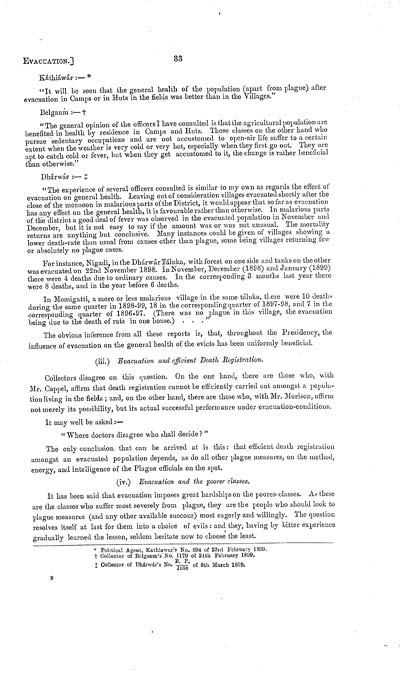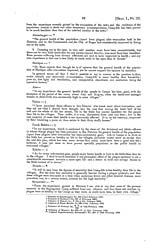Medicine - Disease > Bombay plague: being a history of the progress of plague in the Bombay presidency from September 1896 to June 1899
(63) Page 33
Download files
Individual page:
Thumbnail gallery: Grid view | List view

EVACUATION.] 33
Kthiwr :- *
"It will be seen that the general health of the population (apart from plague) after
evacuation in Camps or in Huts in the fields was better than in the Villages."
Belgaum :-
The general opinion of the officers I have consulted is that the agricultural population are
benefited in health by residence in Camps and Huts. Those classes on the other hand who
pursue sedentary occupations and are not accustomed to open-air life suffer to a certain
extent when the weather is very cold or very hot, especially when they first go out. They are
apt to catch cold or fever, but when they get accustomed to it, the change is rather beneficial
than otherwise."
Dhrwr :-
"The experience of several officers consulted is similar to my own as regards the effect of
evacuation on general health. Leaving out of consideration villages evacuated shortly after the
close of the monsoon in malarious parts of the District, it would appear that so far as evacuation
has any effect on the general health, it is favourable rather than otherwise. In malarious parts
of the district a good deal of fever was observed in the evacuated population in November and
December, but it is not easy to say if the amount was or was not unusual. The mortality
returns are anything but conclusive. Many instances could be given of villages showing a
lower death-rate than usual from causes other than plague, some being villages returning few
or absolutely no plague cases.
For instance, Nigadi, in the Dhrwr Tluka, with forest on one side and tanks on the other
was evacuated on 22nd November 1898. In November, December (1898) and January (1899)
there were 4 deaths due to ordinary causes. In the corresponding 3 months last year there
were 8 deaths, and in the year before 6 deaths.
In Momigatti, a more or less malarious village in the same tluka, there were 10 deaths
during the same quarter in 1898-99, 18 in the corresponding quarter of 1897-98, und 7 in the
corresponding quarter of 1896-97. (There was no plague in this village, the evacuation
being due to the death of rats in one house.) ..."
The obvious inference from all these reports is, that, throughout the Presidency, the
influence of evacuation on the general health of the evicts has been uniformly beneficial.
(iii.) Evacuation and efficient Death Registration.
Collectors disagree on this question. On the one hand, there are those who, with
Mr. Cappel, affirm that death registration cannot be efficiently carried out amongst a popula-
tion living in the fields ; and, on the other hand, there are those who, with Mr. Morison, affirm
not merely its possibility, but its actual successful performance under evacuation-conditions.
It may well be asked :-
" Where doctors disagree who shall decide ? "
The only conclusion that can be arrived at is this : that efficient death registration
amongst an evacuated population depends, as do all other plague measures, on the method,
energy, and intelligence of the Plague officials on the spot.
(iv.) Evacuation and the poorer classes.
It has been said that evacuation imposes great hardships on the poorer-classes. As these
are the classes who suffer most severely from plague, they are the people who should look to
plague measures (and any other available succour) most eagerly and willingly. The question
resolves itself at last for them into a choice of evils : and they, having by bitter experience
gradually learned the lesson, seldom hesitate now to choose the least.
* Political Agent, Kathiawar's No. 894 of 23rd February 1899.
Collector of Belgaum's No. 1179 of 24th February 1899.
Collector of Dhrwr's No. B.P./1058 of 8th March 1899.
Kthiwr :- *
"It will be seen that the general health of the population (apart from plague) after
evacuation in Camps or in Huts in the fields was better than in the Villages."
Belgaum :-
The general opinion of the officers I have consulted is that the agricultural population are
benefited in health by residence in Camps and Huts. Those classes on the other hand who
pursue sedentary occupations and are not accustomed to open-air life suffer to a certain
extent when the weather is very cold or very hot, especially when they first go out. They are
apt to catch cold or fever, but when they get accustomed to it, the change is rather beneficial
than otherwise."
Dhrwr :-
"The experience of several officers consulted is similar to my own as regards the effect of
evacuation on general health. Leaving out of consideration villages evacuated shortly after the
close of the monsoon in malarious parts of the District, it would appear that so far as evacuation
has any effect on the general health, it is favourable rather than otherwise. In malarious parts
of the district a good deal of fever was observed in the evacuated population in November and
December, but it is not easy to say if the amount was or was not unusual. The mortality
returns are anything but conclusive. Many instances could be given of villages showing a
lower death-rate than usual from causes other than plague, some being villages returning few
or absolutely no plague cases.
For instance, Nigadi, in the Dhrwr Tluka, with forest on one side and tanks on the other
was evacuated on 22nd November 1898. In November, December (1898) and January (1899)
there were 4 deaths due to ordinary causes. In the corresponding 3 months last year there
were 8 deaths, and in the year before 6 deaths.
In Momigatti, a more or less malarious village in the same tluka, there were 10 deaths
during the same quarter in 1898-99, 18 in the corresponding quarter of 1897-98, und 7 in the
corresponding quarter of 1896-97. (There was no plague in this village, the evacuation
being due to the death of rats in one house.) ..."
The obvious inference from all these reports is, that, throughout the Presidency, the
influence of evacuation on the general health of the evicts has been uniformly beneficial.
(iii.) Evacuation and efficient Death Registration.
Collectors disagree on this question. On the one hand, there are those who, with
Mr. Cappel, affirm that death registration cannot be efficiently carried out amongst a popula-
tion living in the fields ; and, on the other hand, there are those who, with Mr. Morison, affirm
not merely its possibility, but its actual successful performance under evacuation-conditions.
It may well be asked :-
" Where doctors disagree who shall decide ? "
The only conclusion that can be arrived at is this : that efficient death registration
amongst an evacuated population depends, as do all other plague measures, on the method,
energy, and intelligence of the Plague officials on the spot.
(iv.) Evacuation and the poorer classes.
It has been said that evacuation imposes great hardships on the poorer-classes. As these
are the classes who suffer most severely from plague, they are the people who should look to
plague measures (and any other available succour) most eagerly and willingly. The question
resolves itself at last for them into a choice of evils : and they, having by bitter experience
gradually learned the lesson, seldom hesitate now to choose the least.
* Political Agent, Kathiawar's No. 894 of 23rd February 1899.
Collector of Belgaum's No. 1179 of 24th February 1899.
Collector of Dhrwr's No. B.P./1058 of 8th March 1899.
Set display mode to: Large image | Zoom image | Transcription
Images and transcriptions on this page, including medium image downloads, may be used under the Creative Commons Attribution 4.0 International Licence unless otherwise stated. ![]()
| India Papers > Medicine - Disease > Bombay plague: being a history of the progress of plague in the Bombay presidency from September 1896 to June 1899 > (63) Page 33 |
|---|
| Permanent URL | https://digital.nls.uk/74586094 |
|---|




![Page [34]](https://deriv.nls.uk/dcn4/7444/74448569.4.jpg)